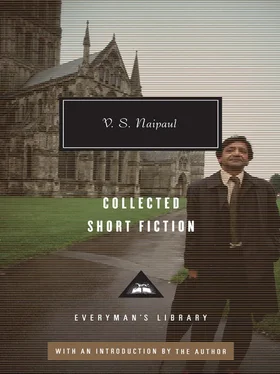As much as by the name Randolph, pleasure was given me by the stately and clean — there is no other word for it — rituals sanctioned by my new religion. How agreeable, for instance, to rise early on a Sunday morning, to bathe and breakfast and then, in the most spotless of garments, to walk along the still quiet and cool roads to our place of worship, and there to see the most respectable and respected, all dressed with a similar purity, addressing themselves to the devotions in which I myself could participate, after for long being an outsider, someone to whom the words Christ and Father meant no more than winter or autumn or daffodil . Such of the unconverted village folk who were energetic enough to be awake and alert at that hour gaped at us as we walked in white procession to our church. And though their admiration was sweet, I must confess that at the same time it filled me with shame to reflect that not long before I too formed part of the gaping crowd. To walk past their gaze was peculiarly painful to me, for I, more perhaps than anyone in that slow and stately procession, knew — and by my silence had for nearly eighteen years condoned — the practices those people indulged in in the name of religion. My attitude towards them was therefore somewhat stern, and it gave me some little consolation to know that though we were in some ways alike, we were distinguished from them not only by our names, which after all no man carries pinned to his lapel, but also by our dress. On these Sundays of which I speak the men wore trousers and jackets of white drill, quite unlike the leg-revealing dhoti which it still pleased those others to wear, a garment which I have always felt makes the wearer ridiculous. I even sported a white solar topee. The girls and ladies wore the short frocks which the others held in abhorrence; they wore hats; in every respect, I am pleased to say, they resembled their sisters who had come all the way from Canada and other countries to work among our people. I might be accused of laying too much stress on superficial things. But I ought to say in my own defence that it is my deeply held conviction that progress is not a matter of outward show, but an attitude of mind; and it was this that my religion gave me.
It might seem from what I have so far said that the embracing of Presbyterianism conferred only benefits and pleasure. I wish to make no great fuss of the trials I had to endure, but it is sufficient to state that, while at school and in other associations my fervent adherence to my new faith was viewed with favour, I had elsewhere to put up with the constant ridicule of those of my relations who continued, in spite of my example, in the ways of darkness. They spoke my name, Randolph, with accents of the purest mockery. I bore this with fortitude. It was what I expected, and I was greatly strengthened by my faith, as a miser is by the thought of his gold. In time, when they saw that their ridiculing of my name had not the slightest effect on me — on the contrary, whereas before I had in my signature suppressed my first name behind the blank initial C, now I spelt out Randolph in full — in time they desisted.
But that was not the end of my trials. I had up to that time eaten with my fingers, a manner of eating which is now so repulsive to me, so ugly, so unhygienic, that I wonder how I managed to do it until my eighteenth year. Yet I must now confess that at that time food never tasted as sweet as when eaten with the fingers, and that my first attempts to eat with the proper implements of knife and fork and spoon were almost in the nature of shameful experiments, furtively carried out; and even when I was by myself I could not get rid of the feeling of self-consciousness. It was easier to get used to the name of Randolph than to knife and fork.
Eating, then, in my determined manner one Sunday lunch-time, I heard that I had a visitor. It was a man; he didn’t knock, but came straight into my room, and I knew at once that he was a relation. These people have never learned to knock or to close doors behind them.
I must confess I felt somewhat foolish to be caught with those implements in my hand.
‘Hello, Randolph,’ the boy Hori said, pronouncing the name in a most offensive manner.
‘Good afternoon, Hori. ’
He remained impervious to my irony. This boy, Hori, was the greatest of my tormentors. He was also the grossest. He strained charity. He was a great lump of a man and he gloried in his brutishness. He fancied himself a debater as well, and many were the discussions and arguments we had had, this lout — he strained charity, as I have said — insisting that to squat on the ground and eat off banana leaves was hygienic and proper, that knives and forks were dirty because used again and again by various persons, whereas the fingers were personal and could always be made thoroughly clean by washing. But he never had his fingers clean, that I knew.
‘Eating, Randolph?’
‘I am having my lunch, Hori. ’
‘Beef, Randolph. You are progressing, Randolph.’
‘I am glad you note it, Hori. ’
I cannot understand why these people should persist in this admiration for the cow, which has always seemed to me a filthy animal, far filthier than the pig, which they abhor. Yet it must be stated that this eating of beef was the most strenuous of my tests. If I persevered it was only because I was strengthened by my faith. But to be found at this juncture — I was in my Sunday suit of white drill, my prayer book was on the table, my white solar topee on the wall, and I was eating beef with knife and fork — to be found thus by Hori was a trifle embarrassing. I must have looked the picture of the over-zealous convert.
My instinct was to ask him to leave. But it occurred to me that that would have been too easy, too cowardly a way out. Instead, I plied my knife and fork with as much skill as I could command at that time. He sat, not on a chair, but on the table, just next to my plate, the lout, and gazed at me while I ate. Ignoring his smile, I ate, as one might eat of sacrificial food. He crossed his fat legs, leaned back on his palms and examined me. I paid no attention. Then he took one of the forks that were about and began picking his teeth with it. I was angry and revolted. Tears sprang to my eyes, I rose, pushed away my plate, pushed back my chair, and asked him to leave. The violence of my reaction surprised him, and he did as I asked. As soon as he had gone I took the fork he had handled and bent it and stamped on it and then threw it out of the window.
Progress, as I have said, is an attitude of mind. And if I relate this trifling incident with such feeling, it is because it demonstrates how difficult that attitude of mind is to acquire, for there are hundreds who are ready to despise and ridicule those who they think are getting above themselves. And let people say what they will, the contempt even of the foolish is hard to bear. Let no one think, therefore, that my new religion did not bring its share of trials and tribulations. But I was sufficiently strengthened by my faith to bear them all with fortitude.
My life thereafter was a lonely one. I had cut myself off from my family, and from those large family gatherings which had hitherto given me so much pleasure and comfort, for always, I must own, at the back of my mind there had been the thought that in the event of real trouble there would be people to whom I could turn. Now I was deprived of this solace. I stuck to my vocation with a dedication which surprised even myself. To be a teacher it is necessary to be taught; and after much difficulty I managed to have myself sent to the Training College in Port-of-Spain. The competition for these places was fierce, and for many years I was passed over, because there were many others who were more fitting. Some indeed had been born of Presbyterian parents. But my zeal, which ever mounted as the failures multiplied, eventually was rewarded. I was twenty-eight when I was sent to the Training College, considerably older than most of the trainees.
Читать дальше









